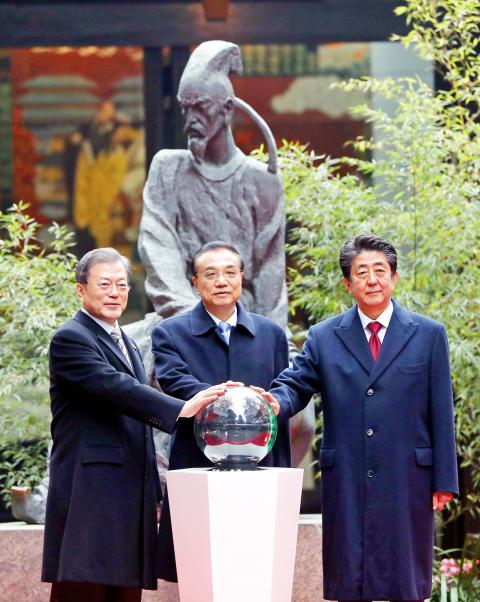In a landmark summit, the leaders of Japan and South Korea signaled that they would not let relations spin out of control even as they made little progress in resolving disputes that have plunged relations to new depths.
South Korean President Moon Jae-in told Japanese Prime Minister Shinzo Abe that cooperation was crucial in the face of regional security threats as the two began their 45-minute meeting on the sidelines of a trilateral summit hosted by Chinese Premier Li Keqiang (李克強) in Chengdu, China.
Abe agreed, and said he also hoped to improve the relationship.

Photo: EPA-EFE
“In the current difficult security situation in East Asia, relations between Japan and South Korea are extremely important. South Korea is an important neighbor,” Abe told reporters after the meeting.
Disputes rooted in disagreement over whether Japan has shown sufficient contrition for its history have hurt trade and hindered cooperation between the two US allies on dealing with North Korea.
The leaders’ meeting came after Pyongyang signaled it might fire a long-range missile as nuclear talks with US President Donald Trump’s administration stall ahead of a year-end deadline for progress set by North Korean leader Kim Jong-un.
No breakthroughs were made and the two aired grievances, but Abe and Moon indicated they would not let their relations spin out of control.
Their simmering feud has raised concerns about whether their fight would hurt global supply chains, and if they could cooperate with Washington as it seeks to put a check on China’s military expansion in the region and curb North Korea’s nuclear ambitions.
Japan and South Korea “are geographically, historically and culturally the closest neighbors, as well as the most important, mutually beneficial partners in terms of human exchanges,” Moon told Abe.
“Our relationship is one that cannot be made distant, even if there is temporarily an uncomfortable issue,” he said.
Moon urged Japan to reverse the tighter trade controls it had placed on South Korea, his spokeswoman Ko Min-jung said after the meeting.
Abe said trade officials would discuss the issue.
For his part, Abe called on Seoul to resolve a disagreement over South Korean court rulings holding Japanese companies liable for cases of forced labor during the 1910-1945 colonization.
The talks had been seen as a positive step that could make it easier for the two nations to bridge differences on simmering disputes that include Japan’s export curbs on goods vital to South Korea’s massive technology sector, part of which was eased last week.
The standoff has damaged trade and tourism ties, with the number of South Koreans visiting Japan last month falling by almost two-thirds on the previous year, while Japan’s beer exports to its neighbor collapsed to virtually zero in October.
However, under pressure from the US, South Korea last month suspended its plan to withdraw from a military information-sharing pact with Japan. Since then, there have been hints of a potential thaw in ties.

A Chinese aircraft carrier group entered Japan’s economic waters over the weekend, before exiting to conduct drills involving fighter jets, the Japanese Ministry of Defense said yesterday. The Liaoning aircraft carrier, two missile destroyers and one fast combat supply ship sailed about 300km southwest of Japan’s easternmost island of Minamitori on Saturday, a ministry statement said. It was the first time a Chinese aircraft carrier had entered that part of Japan’s exclusive economic zone (EEZ), a ministry spokesman said. “We think the Chinese military is trying to improve its operational capability and ability to conduct operations in distant areas,” the spokesman said. China’s growing

Taiwan yesterday denied Chinese allegations that its military was behind a cyberattack on a technology company in Guangzhou, after city authorities issued warrants for 20 suspects. The Guangzhou Municipal Public Security Bureau earlier yesterday issued warrants for 20 people it identified as members of the Information, Communications and Electronic Force Command (ICEFCOM). The bureau alleged they were behind a May 20 cyberattack targeting the backend system of a self-service facility at the company. “ICEFCOM, under Taiwan’s ruling Democratic Progressive Party, directed the illegal attack,” the warrant says. The bureau placed a bounty of 10,000 yuan (US$1,392) on each of the 20 people named in

Nine retired generals from Taiwan, Japan and the US have been invited to participate in a tabletop exercise hosted by the Taipei School of Economics and Political Science Foundation tomorrow and Wednesday that simulates a potential Chinese invasion of Taiwan in 2030, the foundation said yesterday. The five retired Taiwanese generals would include retired admiral Lee Hsi-min (李喜明), joined by retired US Navy admiral Michael Mullen and former chief of staff of the Japan Self-Defense Forces general Shigeru Iwasaki, it said. The simulation aims to offer strategic insights into regional security and peace in the Taiwan Strait, it added. Foundation chair Huang Huang-hsiung

PUBLIC WARNING: The two students had been tricked into going to Hong Kong for a ‘high-paying’ job, which sent them to a scam center in Cambodia Police warned the public not to trust job advertisements touting high pay abroad following the return of two college students over the weekend who had been trafficked and forced to work at a cyberscam center in Cambodia. The two victims, surnamed Lee (李), 18, and Lin (林), 19, were interviewed by police after landing in Taiwan on Saturday. Taichung’s Chingshui Police Precinct said in a statement yesterday that the two students are good friends, and Lin had suspended her studies after seeing the ad promising good pay to work in Hong Kong. Lee’s grandfather on Thursday reported to police that Lee had sent